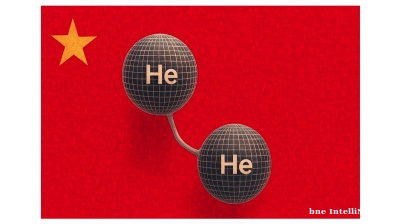China is on track to overtake France and the United States as the world's leading source of atomic power

China is on track to overtake France and the United States as the world's leading source of atomic power, a significant milestone in the global energy landscape, Bloomberg reports.
The country's rapid advancements in nuclear technology are expected to propel it to the forefront of nuclear energy production.
China's strides in nuclear power are not limited to current technologies. Experts predict that China is "likely 10 to 15 years ahead of the US in its ability to deploy fourth-generation nuclear reactors at scale."
This development underscores China's growing dominance in the energy sector and its ability to harness cutting-edge technology for large-scale deployment.
As bne IntelliNews reported, the Shanghai-based commercial fusion energy company Energy Singularity announced on June 19 that it has successfully built the world’s first fusion reactor that produces more energy than it takes in to run it. Energy Singularity’s technology is based on a high-temperature superconducting tokamak device, Honghuang 70 (HH70).
At the same time, China has become the global green energy champion and two thirds of the world solar panels deployed today are deployed in China. In another milestone, solar and wind power overtook coal as the biggest contributor to China’s energy mix this month.
Despite these developments, China remains the world’s biggest emitter of greenhouse gases (GHGs) and remains heavily dependent on coal for power. But in theory, Beijing has the right to use coal as an transitionary power source as it continues to enjoy a very large surplus in its carbon budget, whereas the US and EU have already spent their entire allotment of carbon emissions allocated as part of the Paris Agreements in 2015.
Fourth-generation nuclear reactors represent the next frontier in nuclear technology, promising greater efficiency, enhanced safety features and the ability to utilise fuel more effectively. China's lead in this area could have far-reaching implications for the global energy market and China’s clout as an emerging superpower.
China's progress comes as the country continues to invest heavily in its nuclear infrastructure, building new reactors at a pace that far exceeds that of the US and France. This aggressive expansion is part of China's broader strategy to reduce its reliance on coal and other fossil fuels, while also meeting its growing energy demands in an environmentally responsible manner.
bneGREEN

Iran faces critical water crisis after driest year in five decades
Iran faces critical water crisis after driest year in five decades with 40% nationwide rainfall drop.

Global renewables to double by 2030, but IEA warns momentum must accelerate
Global renewable energy capacity is on course to double by 2030, reaching 4,600 GW—comparable to the current combined total of China, the European Union and Japan—according to the International Energy Agency’s Renewables 2025 report.

South Korea’s embrace of SMRs as a pillar of nuclear policy
Spearheaded by Korea Hydro & Nuclear Power, these compact reactors are increasingly being seen as central to the nation's energy policy, offering flexibility, scalability, and ultimately a pathway to carbon neutrality

China leads global energy export race as clean tech shipments hit record highs
China is outpacing the US in the global race to dominate energy exports, as demand for clean technology surges and fossil fuel revenues plateau. China exported $120bn in green technology through July 2025, surpassing the US' oil and gas exports.

